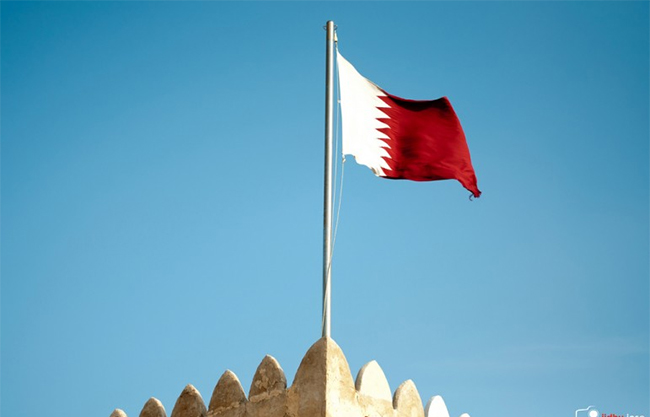Kingdom of Saudi Arabia, Bahrain, the United Arab Emirates and Egypt severed diplomatic ties and transport links with Qatar on Monday, accusing it of supporting “extremism”. The dispute between Qatar and the Arab countries escalated after an alleged statement by the emir of Qatar on regional politics, which triggered a backlash from Saudi and Emirati media outlets. The Qatari government denied the statement, claiming their national news agency was hacked.
On Tuesday, Saudi Arabia’s Foreign Minister Adel Al-Jubeir told reporters in Paris that Qatar must end its support for the Palestinian group Hamas and the Muslim Brotherhood before ties with other Gulf Arab states could be restored.
Subsequently, Hamas said in a statement that al-Jubeir’s remarks “constitute a shock for our Palestinian people and the Arab and Islamic nations”.
The dispute comes less than a month after the US President Donald Trump visited Saudi Arabia and called for Muslim nations to unite against “extremism”. Therefore, German Foreign Minister Sigmar Gabriel accused Trump of stirring up conflicts in the Middle East and risking a new arms race.
Six Middle Eastern countries – Saudi Arabia, Kuwait, the United Arab Emirates, Bahrain, and Oman are members of the Gulf Cooperation Council (GCC). The unified economic agreement between the countries of the GCC was signed on November 11, 1981 in Abu Dhabi. The purpose of the GCC is to achieve unity among its members based on their common objectives and their similar political and cultural identities, which are rooted in Islamic beliefs.
By and large, Qatar’s support for the Muslim Brotherhood, Hamas and radical Islamists in Libya has led to increasing tensions with other Arab states of the Persian Gulf. These tensions came to a head during a March 2014 meeting of the GCC, after which the UAE, Saudi Arabia and Bahrain announced the recall of their ambassadors to Qatar.
On June 5th 2017, the tension prompted Saudi Arabia, UAE, Bahrain and Egypt to officially cut diplomatic ties with Qatar. Saudi Arabia said it took the decision to cut diplomatic ties due to Qatar’s “embrace of various terrorist and sectarian groups aimed at destabilizing the region”, including the Muslim Brotherhood, al-Qaida, Islamic State of Iraq and the Levant (ISIL) and groups supported by Iran in the kingdom’s eastern province of Qatif.
The Muslim Brotherhood was founded in Egypt by Islamic scholar and schoolteacher Hassan al-Banna in 1928 and gained supporters throughout the Arab world. The Muslim Brotherhood was a movement, not a political party, but its members have created political parties in several countries, such as the Islamic Action Front in Jordan and Hamas in Gaza and the West Bank and the now disbanded Freedom and Justice Party in Egypt. These parties are staffed by Brotherhood members but they are kept independent from the Muslim Brotherhood to some degree.
Following the Egyptian Revolution of 2011 and fall of Hosni Mubarak, the Brotherhood was legalized, but it has suffered severe reversals in 2013. The Egyptian Muslim Brotherhood was legalized in 2011 and won several elections, including the 2012 presidential election when its candidate Mohamed Morsi became Egypt’s first elected president.
However, it faced periodic government crackdowns for alleged terrorist activities, as in 2015 it was considered a terrorist organization by the governments of Bahrain, Egypt, Russia, Syria, Saudi Arabia and United Arab Emirates.
Although Qatar is the home of the largest US military base in the region and served as the US Central Command headquarters and one of the main launching sites of the invasion of Iraq, Trump supported Riyadh’s policy regarding Qatar. Trump’s supportive stance is not surprising, since he seeks to adopt a strong counterinsurgent strategy. In his inaugural speech, Trump pledged to root out extremism “from the face of the Earth”. In the meantime, Saudi Arabia and the US shares a strong political and commercial ties, and Saudi certainly prefers America’s relationship to Qatar.
On the other hand, the Muslim Brotherhood was declared as a terrorist group by Saudi and some other countries but not by Qatar. Therefore, Qatar – a traditionally religious country where flogging and stoning are rife – will make no bones about supporting the Brotherhood party or its branch Hamas. It is believed that since Hamas is a legal party for Iran – although their relations have been soured over Syria’s conflict – Qatar’s support to Hamas will bring Doha and Tehran closer. Subsequently, Saudi would have drawn this conclusion that Iran and Qatar work in tandem.
Two days after the Riyadh-Doha’s diplomatic cutoff, a twin terrorist attack occurred in Iran, for which the ISIL claimed responsibility. This incident is believed to raise Iran’s suspicion against Saudi and a blame game will surface. Earlier, Saudi and the US blamed Iran for its involvement in Syria’s conflict.
The blame game and Riyadh-Doha’s deteriorating relations are believed to compound the tension in the Middle East. Qatar denied supporting extremism saying that there was “no legitimate justification” for several nations severing diplomatic ties and the decision was in “violation of its sovereignty”. Which one do you think is right Saudi Arabia or Qatar?
Home » Opinion » The Consequence of Riyadh-Doha Tension
The Consequence of Riyadh-Doha Tension
| Hujjatullah Zia

